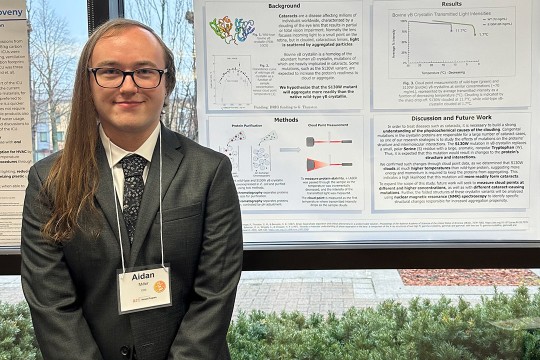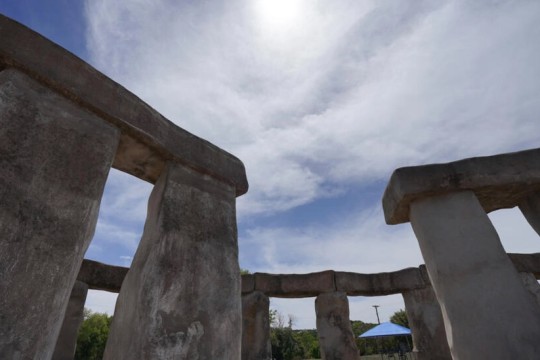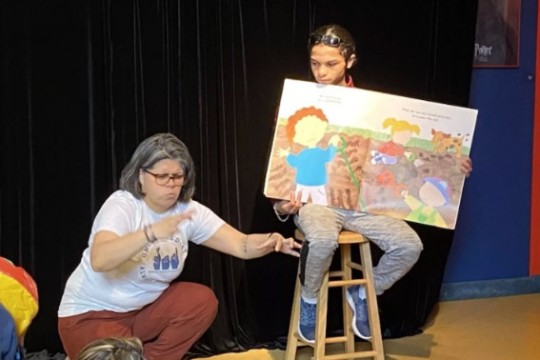RIT Outstanding Graduate Woman Achievement Award highlights Graduate Student Advisory Council leaders
Astrophysics Ph.D. students Emily Wilson and Teresa Symons win honor
Emily Wilson, left, and Teresa Symons are co-recipients of the Outstanding Graduate Woman Achievement Award for their dedication and leadership on RIT’s Graduate Student Advisory Council.
RIT students Emily Wilson and Teresa Symons are co-recipients of the Outstanding Graduate Woman Achievement Award for their dedication and leadership on RIT’s Graduate Student Advisory Council.
Wilson and Symons are Ph.D. students in the astrophysical sciences and technology program in the School of Physics and Astronomy and co-chairs of the Graduate Student Advisory Council.
Twyla Cummings, RIT associate provost and dean of graduate education, established the award in 2018 to recognize the contributions of women whose leadership and mentorship enhance the RIT graduate experience.
“Both Emily and Teresa are brilliant students and very good RIT citizens,” Cummings said. “They have been tremendous in their dedication to the Graduate Student Advisory Council. They have been staunch advocates, bringing to me issues that graduate students are concerned about and pursuing them until we have an answer.”
Wilson ’19 MS (astrophysical sciences and technology), from King of Prussia, Pa., studies stellar evolution and binary star systems with Jason Nordhaus, associate professor of science and mathematics at NTID and a member of the Center for Computational Relativity and Gravitation. Symons, from Hamburg, Pa., studies the cosmic optical background with Michael Zemcov, associate professor of physics and astronomy, and a member of the Center for Detectors. Wilson and Symons anticipate finishing their Ph.Ds. in 2022.
As executive chairs of the Graduate Student Advisory Council, Wilson and Symons were quick to work together to set goals to better the experience for other graduate students. During their tenure, they have increased representation, created liaisons to special interest groups, and instituted an anonymous feedback form. When the COVID-19 pandemic hit, they served as graduate student representatives on the academic fall planning committee and as observers on the RIT Board of Trustees.
“We’ve had a very productive year,” Cummings said. “We started last summer when we put together a task force on COVID issues and we’ve gone from there to issues not necessarily related to COVID to address concerns that grad students have. Students are requesting transparency, and if the answer is ‘no,’ they want to understand the practice or policy explaining why.”
Wilson and Symons have worked hard to clarify the advocacy role of the Graduate Student Advisory Council, connecting with on-campus resources and networking with RIT alumni.
“GSAC has evolved,” Symons said. “There was confusion about what it was. It is not a social club.”
Wilson and Symons balance their astrophysics research and their community activity.
“I don’t feel it’s an option to sit back and do nothing or not to advocate for change where it seems necessary,” Symons said, adding that she wants to help graduate students who follow her.
Being active is a personal obligation for Wilson as well. “There has to be something more than research. Everything I do is for the person I want to become.”
Within their own graduate program, they are peer mentors and proponents for inclusion. They took part in the Strike for Black Lives in the physics community and have created a space for dialogue in the School of Physics and Astronomy.
Wilson created a discussion series on equity for Black physics and astronomy students in response to the Black Lives Matter movement and an American Institute of Physics’ report focused on improving representation in undergraduate physics and astronomy.
Symons is also contributing to diversity and equity efforts within their program by developing a research and learning experience for Rochester area high school students who will join her research group for the summer.
“This is part of a broader effort in our department, which will involve students joining several of our department’s research groups,” Symons said.
As they enter their final year at RIT, Wilson and Symons are stepping down as co-chairs of the Graduate Student Advisory Council. They are helping the new chair form her own transition team and are looking forward to becoming general members.















